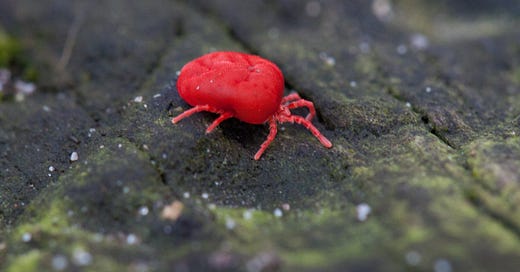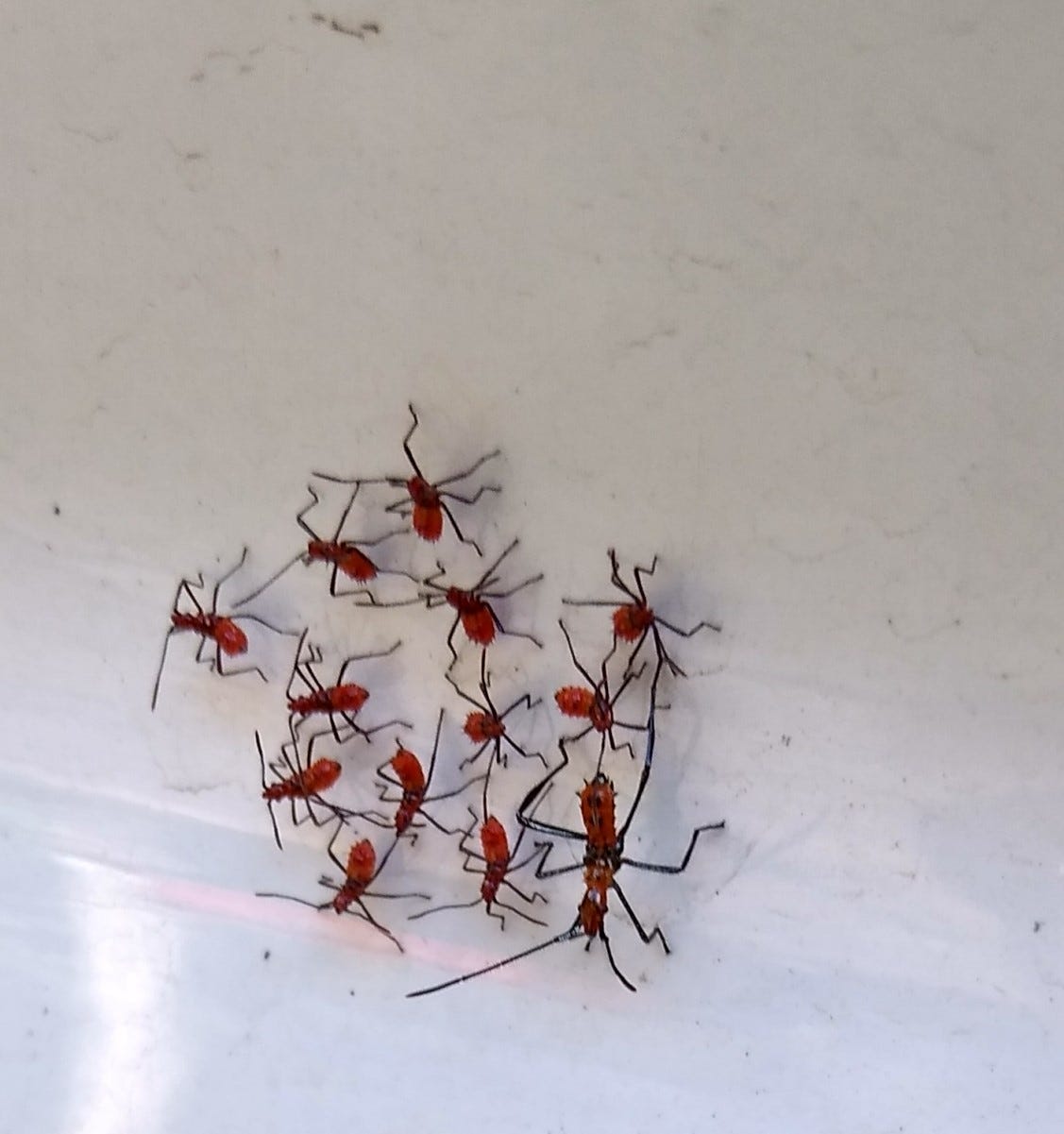Welcome to Natural Wonders, where I try to find out the answers to random questions that pop into my head while I’m out in the woods. This week’s question is near and dear to my heart (as you’ll read below), but it’s also in response to a subscriber’s request to research chiggers — if you have a question you’d like me to dig up answers for, please leave a comment at the bottom of the newsletter. If someone forwarded you this email, you can subscribe below:

If my husband is a tick magnet, then I think it’s fair to say I am a chigger magnet. Or maybe “chigger chick” should be the term. At any rate, in the summer I can’t walk through grass without picking up at least a few of these maddeningly itchy bugs.
The worst case of chiggers I ever got was at a Boy Scout Leader camp in Florida in May of 1991. I remember the date because it was only a week after Andrew and I got married, and the other counselors teased that I was spending my honeymoon becoming certified as a Boy Scout ropes course leader, the only woman in a group of a couple hundred men. The camp was set up among the Florida palmettos and prairie grasslands, and that’s apparently where chigger heaven is located because all of us had bites on top of bites until our ankles swelled inside our boots. And not a bottle of fingernail polish to be found.
I’ve always been told that chiggers, a practically invisible blood-sucking pest, will burrow into your skin and stay there for days. I’ve heard they may even lay eggs inside. The only way to get rid of them is by painting over the bite with fingernail polish so they suffocate.
Somehow, that never seemed to work for me. The lumpy bites still itched for days, whether I used the nail polish or not, though I’ll admit it’s really hard not to peel off the polish as I give in to a frenzy of scratching. After 30+ years, it’s finally time to find out…
Does fingernail polish really kill chiggers?
Chiggers live almost everywhere in the world. In Britain they’re called “harvest mites” and in other places “bush mites” and “redbugs,” but they’re all the same animal – a mite that belongs to the arachnid class of animals. Meaning, they’re a relative of ticks and spiders.

The chiggers themselves are the larva stage of adult redbugs. They’re practically microscopic – half a dozen chiggers could fit inside the period at the end of this sentence. They start as eggs and then hatch into the 6-legged parasitic larva that feed on not only humans but also box turtles, rabbits, toads, quail and even some insects. After chiggers have eaten their fill, they drop to the ground and become nymphs and then 8-legged adults that are harmless and eat mostly plant matter. So, they start their lives as carnivores (parasites) but end it as herbivores.
However, it’s what they do while they are parasites that may just blow your mind. The good news is that they do NOT lay eggs in your skin but instead prefer the underside of a leaf for protection. The other good news is that they do NOT burrow into your skin and live there – they can conceivably stay on the surface of your skin for about three days until they’ve eaten their fill, but they’re actually pretty easy to scratch off or get rid of with a hot shower. That’s the good news.
The bad news is that while chiggers don’t actually bite their host, they do pierce the skin to form a hole and inject an enzyme that slowly liquifies the skin. As the enzyme dissolves, it gradually works its way down through the skin, forming a funnel or hole in the tissue called a stylostome. Chiggers then suck up the liquified skin as food, like a milkshake through a straw (they don’t drink your blood, just your skin). However, if you do scratch them off soon after they’ve bitten you, it’s too late to avoid the itchiness – the tube in your skin remains and oozes liquified skin for several days.
You are basically a chigger Slurpee.

The itchiness is at its worst in the first 24-48 hours. Even if the chigger is gone, the enzyme it injected is melting your skin and that’s what’s causing the itchiness.
It’s way too late for fingernail polish.
So, what can you do? Anti-itch creams and lotions do help. Fingernail polish, rubbing alcohol, and bleach don’t work any better than just taking a soapy shower after you think you’ve been exposed. Mostly, you just have to wait for the enzyme to run its course and stop itching after a few days.
The best way to avoid chigger bites in the first place is to stay away from damp areas with low shrubs and grass. Chiggers tend to congregate in “islands,” which is why sometimes you’ll get bites and sometimes you won’t. Tuck your pants into your boots and spray them with insecticide – chiggers tend to drop onto your feet and then crawl upwards until they find somewhere tight (your socks or waistband) or where skin folds on itself (your arm pit or the back of your knee).
But most of all, take a warm, soapy shower as quickly as you can after walking through a grassy area that probably has chiggers. This is the remedy that’s helped me the most, though it’s not always successful if I’ve been out hiking for hours. Fortunately, chiggers are a summer bug and become inactive once the temperature drops to 60° F (16° C)– so the season is almost finished! Good news for this chigger chick…
What about you? Did you spend your honeymoon or other milestone moment getting Slurpeed by chiggers? Or do you have a remedy for the itchiness? Share your thoughts!
Weird Nature:

Detritus:
Hummingbirds are about to migrate, if they haven’t already in your area. We know the same ones come back to your house each year, so make sure to keep feeding them until they no longer return to your feeder!
Check out the Comedy Wildlife Photograph Awards - my favorite is the duck.
You may not think of Iceland as your next beach vacation, but their coastline is beautiful.
Ask a Bear - are they smarter than dogs?
If you liked this issue, please click the “like” button below - it makes me happy and also raises the profile of this newsletter!





Another fascinating article, thank you. I've never heard of chiggers in New Zealand, and if they occur, they must be rare. I've spent a heap of time working in the outdoors and never encountered anything which could be them. It's possible that we don't have a lot of mammal-biting beasties because of our lack of native land mammals. However, that didn't prevent us getting some pretty fierce sandflies, not to mention our lethal nettles (literally lethal, but only in rare circumstances).
It's good news that the chiggers mite doesn't burrow into your skin and lay eggs there, but in the process of trying to find out whether chiggers occur in New Zealand I found that there is a mite that does that - the scabies mite. Fortunately I've never encountered that either.
So glad the temp is getting down to 60 degrees, at least in the morning!